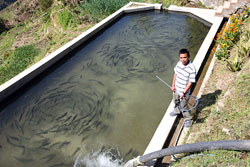|
|
Padam Rumba reaches into the water, where hundreds of fish swim in circles, and scoops one out. The fish gasps and struggles in his hand, but Padam maintains his hold on the slippery creature. The fish writhes, and its scales glint blue, gold and red in the bright sunlight. Padam puts the rainbow gently back into the water and the fish swims away with a wet flick of its tail.
Padam started his trout restaurant in Betini six years ago, and it has now grown to be the biggest and most popular in the area. Just 38km from Kathmandu near Kakani, the restaurant is drawing huge hordes of hungry picnickers from the capital.
Barely twenty years ago, these scenic mountains of Nuwakot were just a place you passed through on the ride to Trisuli. Today, it is bustling with restaurants that serve fish reared in quick-flowing local streams. Betini today rivals Malekhu, and in terms of taste outpaces it.
"Raising fish is just like any other job, you need hard work, dedication and a lot of patience," says Rumba who looks after the 17 pools that hold three tons of trout at any given time.
|
|
As a customer you can pick out a fish and Rumba's wife will cook it in anyway you like. From crispy deep-fried to thick aromatic curry, the trout tastes heavenly. The meat is tender and soft and there are no bones to pick out. But like all good things, it comes at a price. A kilo of rainbow trout, raw, costs Rs 750. Add Rs 150 to that if you want it fried.
When Purna Bahadur Lama first started raising trout back in 1997, he had 400 fish and one pool. Lama used to work for the government fishery in Trisuli and there he saw Japanese rainbow trout for the first time. Supported by the Nepal Agriculture and Resource Centre, Lama raised Rs 60,000 and started his own farm and restaurant. The site in Nuwakot was perfect because of its cool temperature and abundant running water. Proximity to Kathmandu meant a never-ending stream of customers willing to pay for the rare treat.
"When I told people I was raising fish they all laughed at me," recalls Lama. "They're not laughing anymore, they're eating my fish." In the past 11 years, Lama's business has grown exponentially.
|
|
Lama and Rumba's restaurants are small and homely, and surrounded by concrete pools full to the brim with rainbow trout. They are built along the contours of terraces and fed by streams. The higher pools hold the spawn while the lowest ones have the biggest trout, ready to be plucked out and thrown into the frying pan.
Trout restaurants have sprung up all along the roadway, and there are more than 20 fish farms in Nuwakot alone.
Japanese rainbow trout are notoriously finicky and difficult to raise. They require water temperatures between 3 and 20 degree celsius with regulated oxygen levels. The pools need to be cleaned once a week and older fish need to be kept away from the young.
Most of the trout diseases come from poor feed, but Rumba has eliminated that by making his own and breeding his own fingerlings. Rumba has no qualms selling his feed and spawn to rivals, it just makes the fish pie bigger and everyone benefits.
Rumba sells at least 5kg of fish each day and on weekends, more than 20kg. He also supplies 40kg of trout each month to three hotels in Kathmandu.





